An International Aid Agency, Oxfam, On October 3, warned that a quick-fix bargain for peace could reverse improvements for Afghan women's rights gained over the last decade. The organization alarmed that if women put out of the core search for peace, they would face a dangerous future after 2014, the deadline for completion of military withdrawal.
In report, it referred downward slide in the advances women begun to make after outstation of Taliban regime in 2004, like the share of women at President Karzai's cabinet as well as their engagement in the civil service that, based on the report, dropped from 31 percent in 2006 to 18.5 percent in 2010.
Considering the numerical data of the report, of course it seems nightmarish for all human rights activists, in general, and women rights activists, in particular.
However, the context of the report is not much different from other reports released by other sources and parts of domestic experts, who from the very start of the notion of peace process, put woman achievements at the center of opposing Karzia's administration efforts.
Their standing was clear and based on the previous understanding Afghan people have from Taliban regime. However, efforts have been made to change the general concept of common people from Taliban and Taliban regime through innovating new terms and playing with words and terms. Watching Media, it is not very complicated to understand that how terms that signal friendship and fraternity have largely poked in and become the daily dish of Media and newspapers.
During past few years, many have tried to challenge the notion that people have about rebellions and insurgency. The question that who is Taliban largely circulates among Afghan people. Previously, people had a definite and clear answer to the question. They do not anymore.
The concept that who are Taliban is somehow distorted as there are people who challenge that notion. Questions are put like this, "Who are Taliban? Are they still those who established Emarat Islami? Are they students graduated from Maddressah?" No doubt, there is huge number of students graduated from Afghan and Pakistani religious Madressah, but they are not linked to any insurgency groups fighting foreign and Afghan armies. They also maintain that Taliban are not those who actually established Emirate.
They might not prevent girls going to school if they are provided the chance to occupy a post in the government. There are also other definitions like Taliban are consisted of various groups that do not share a common ideology. Instead what has made them to stick together is common interest—opposing Afghan government.
However, efforts worked out somehow and created confusion among common people but least affected educationally above layer of the society. They still strongly believe that Taliban regime is a kind that be exposed to change that easily. They still strongly believe that fights for establishment of an Islamic regime based on understanding of Mullah Mohammad Omer and other Taliban leaders.
Without going against or favor of the notion, there is something certain that Taliban leaders would accept the woman participation in civil services and other social, economic and political sphere as they are involved now. Even those who try to depict a new image of Taliban-led militants, they know it.
And there is the possibility the very people now holding administrative or political posts are against forcedly remained silent against woman social and political broke out. If the circumstance goes to their favor, they would be proved far conservative and traditionalists.
Thus, there is one thing clear that, not only Taliban militants, but some people within the administration have anti-women tilt if the circumstances change and they are provided the chance to express their inner tendency. The danger would be multiplied on the absence of foreign forces in whose presence many dare not to pressurize government to include their Islamic interpretation of women rights and restrict laws previously approved with annexation of conditions.
Up to here, no body doubts and Oxfam's wearing report is true.
But no body should doubt there is occurring fundamental change in Afghan society. And certainly the numerical data of women participation in civil services is right, but I have always emphasized that initially people, due to years of repressions and suppression by Taliban, largely welcomed the notion where everybody has the freedom to do what he wants—within the democratic legal system. Years later, that previous enthusiasm scaled down and decreased noticeably.
As the initial floods of emotions and sentiments have decreasing, we witness a creeping change in social structure that prepares for acceptance of women. In many big cities, common people's concept of women has undergone fundamental change due to exposition to circulation of ideas and theories put by liberal wings.
Three years ago, girls were walking generally in group in order to feel safer against frequently boys' teasings and cheatings. Early in the evening, streets of Kabul were full of women as they rushed to reach home before it was dark.
Now the situation is much promising. There are single girls walking lonely on the road even when the weather gets pitch-dark. However, the change in Kabul city that also on the very particular issue cannot denote on fundamental change in entire Afghan society.
There are provinces where the participation of women is too poor and their turn out in the elections as well as engagement in social services is inconvenient condition. Meanwhile, it shouldn't be ignored that Afghan partly has opened and accepted creeping change. So, there is a situation of fear and optimism.

